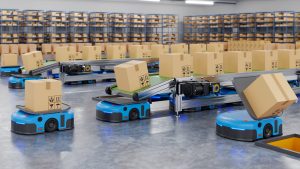
Bulk material handling is an essential part of any industrial or manufacturing process. Raw materials must be delivered to a factory, unloaded into storage facilities, and then poured into silos, hoppers, and other vessels for processing. Automated bulk material handling can make these processes more efficient. Here are some of the latest technology that can help move material in a faster, safer, and even cheaper way.
Automated guided vehicles (AGVs)
AGVs are self-propelled vehicles that can move large volumes of material along a defined pathway, like receiving to the warehouse or straight to the production lines. They can replace manually-operated forklifts and carts, or be used in areas that can’t be reached by conveyor systems.
The AGVs are guided by software and sensors. They can be programmed to run at specific times or stages during the production cycle so that materials are delivered whenever they are needed, without interruption.
There are many different kinds of AGVS: forklifts, carts, towing vehicles, and unit load handlers for small items.
Automated Storage & Retrieval System (AS/RS)
AS/RS systems handle, store, and retrieve materials in warehouses and other storage facilities. This can include automated carousels, vertical lifts, shuttles, and other machines that can lift heavy loads.
AS/RS can maximize storage space, reduce damage to products, and improve inventory control. Since fewer people are required to move items, companies can also tighten security and limit who can access the warehouse and other storage areas.
Warehouse Tracking
Warehouses need to follow a first in/first out system so that materials don’t spoil. However, new shipments are usually placed on top of the stack, so it’s hard to track where the oldest materials are.
Smart warehouse technology systems use coordinated routing, tracking, and control systems to show employees which box or bag must be used next. This includes a consolidated Warehouse Management System (WMS), automated picking tools, and automated inventory control platforms.
Aside from preventing spoilage, these new bulk material handling technologies reduce the cost of manpower and improve demand forecasting.
Machine Monitoring
Machine monitoring prevents shutdowns caused by machine failure.
Sensors alert operators of any problems in mixers, grinders, or conveyors. For example, the material got wet and stuck to the machine, or the scales malfunctioned and overloaded the vessel.
Sensors can also detect vibrations, unbalanced loads, and temperatures of the bearings. While it won’t be able to diagnose the problem, automated monitoring allows operators to troubleshoot and do preventive maintenance.
The sensors are actually required in industries that work with fine powders or other flammable materials that could be ignited by excessive friction in machine parts.
Some sensors have been around for more than a decade, and are proven effective in preventing plant accidents. DAZIC zero speed switches can be attached to conveyors, bucket elevators, and other equipment in a material conveyor system. It detects abnormal changes in speed that could lead to material pileup.
Material flow aids
Poor or irregular material flow slows down production and compromises batch consistency. Stagnant material can also lower the storage capacity of silos and hoppers and may deteriorate and spoil.
Traditionally, workers would have to manually clear material with hammers and pick-axes. However, modern material flow aids like AirSweep can prevent material blocks from occurring.
AirSweep releases powerful air pulses that move stagnant material back into the flow stream. It can be used during processing to ensure first-in / first-out flow, or after processing to flush the vessels clean before the next batch.
Here’s how the AirSweep system allows automated bulk material handling:
Contact us to find out more about AirSweep and other products that can improve your bulk material handling.





Comments are closed